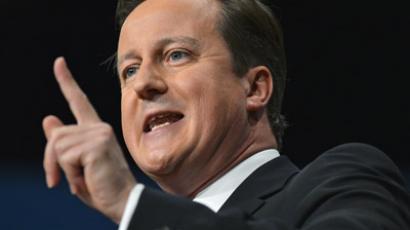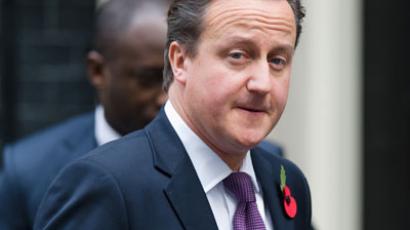'Stay for our sake': US urges Britain to remain in EU
Amid growing concerns that the UK may drop out of the EU, the Obama administration has publicly stated that it is in US interests to see Britain as part of the bloc. Many see the move as interference in the national debate.
The comments from Washington come days before British Prime Minister David Cameron is set to deliver a speech in which he is expected to promise to hold a referendum over Britain’s place in the 27-member bloc.Philip Gordon, assistant secretary for European Affairs at the State Department, warned that there would be consequences for Britain if it quits the union or plays lesser role in it."We welcome an outward-looking European Union with Britain in it. We benefit when the EU is unified, speaking with a single voice, and focused on our shared interests around the world and in Europe. We want to see a strong British voice in that European Union. That is in the American interest," he said during a visit to London on Wednesday.Washington officials have made similar warnings in private in recent weeks, but this marked the first time a named senior member of Obama’s government has spoken on the record about the risks posed by Britain’s EU-membership debate.“We’ve always known that the US prefers that the UK have a close relationship with the EU because when it wants something done, it’s Britain that it calls. But this direct challenge to the government over Europe is something new,” RT correspondent Laura Smith said.Cameron has been largely in favor of the UK staying within the EU, but believes there is a need to redefine the relationship in light of moves towards further integration by countries using the euro single currency. The premier suggested "fresh consent" for any new deal that emerges as a result of negotiations with other EU countries."The US wants an outward-looking EU with Britain in it, and so do we," a spokeswoman for the PM’s Downing Street office responded to the US comments, according to Reuters.However, the opposition Labour Party's foreign affairs spokesman Douglas Alexander pointed out that the US comments raised concerns about Britain's role in Europe. "There is today a real risk of Britain sleepwalking towards exit because of a prime minister motivated more by the need for party unity than by the interests of the country," he said.Cameron’s deputy, Nick Clegg, says US concerns over Britain's EU membership are spot on. “[Washington] is perfectly entitled to say ‘if you’re interested in the American perspective, we think Britain stands taller in the world if you stand tall in your own neck of the woods,'” Clegg told LBC radio. It comes after anti-EU members of Cameron's ruling Conservatives demanded a new UK role inside the bloc, or a referendum on whether Britain should leave the Union altogether. Many MPs are calling for the premier to carry out a referendum on the question of whether the UK remains in the EU or not, a so-called ‘in-out vote,' which Cameron doesn’t support.According to a Times poll in June, 82 per cent of people would like a referendum on Britain’s membership of the European Union. ComRes poll made for the Independent in December 2011 stated that 52 per cent of British people would agree that the eurocrisis provided an ideal opportunity for the UK to quit the bloc. Twenty-six per cent of Britons disagreed, while the remaining 22 per cent couldn’t agree or disagree. It should be pointed out that Conservative voters (58 per cent) were more likely than Labour (45 per cent) voters to agree that Britain should leave the EU.
Some argue that if Britain turns its back on the EU, its biggest trading partner, it may then compensate by drawing closer ties with the US. Meanwhile, British business leaders have warned that a UK exit from Europe will leave it outside a possible future trade deal between the US and the EU.
American motivation
As Washington makes clear its view on the issue, many have accused the US of only looking out for its own interests."The US is overtly interfering with internal British politics…because they don’t want the inconvenience of dealing with a large number of democratic nation states. They want to deal with one centralized political state in Europe – the European Union," British MEP Gerard Batten told RT."[The US] couldn’t care less about our national interests and our democratic rights. It's about their foreign policy and what they think is best for them…President Obama should butt out of British affairs," he said.
Germany has also joined the debate, warning Cameron not to ‘blackmail the rest of Europe.’ "You cannot create a political future if you are blackmailing other states. That will not help Britain. It needs a Europe that is stable. It needs markets that are functioning," the chair of Germany’s European affairs committee, Gunther Krichbaum, said in a statement.Krichbaum said he is convinced that although all EU member states need each other, Britain would suffer more than the rest of the EU from its absence. He believes that Cameron’s expected referendum is a high-risk maneuver which is better left alone.“There is certainly a risk that [a referendum] could paralyze efforts for a better Europe and deeper integration. Britain would risk being isolated. That cannot be in Britain’s interests,” he said.














